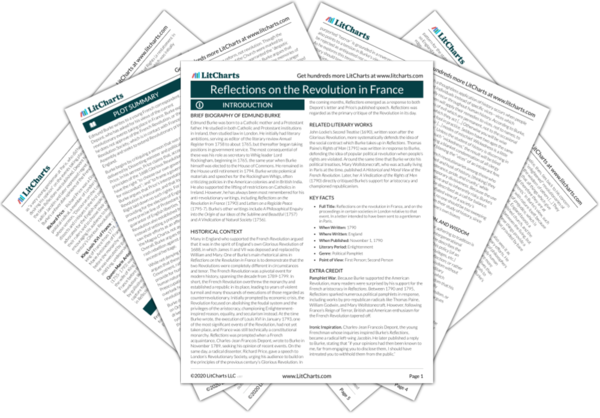French Revolution Quotes in Reflections on the Revolution in France
I flatter myself that I love a manly, moral, regulated liberty as well as any gentleman of that society, be he who he will […] But I cannot stand forward, and give praise or blame to any thing which relates to human actions, and human concerns, on a simple view of the object, as it stands stripped of every relation, in all the nakedness and solitude of metaphysical abstraction. Circumstances (which with some gentlemen pass for nothing) give in reality to every political principle its distinguishing colour, and discriminating effect. The circumstances are what render every civil and political scheme beneficial or noxious to mankind. Abstractedly speaking, government, as well as liberty, is good; yet could I, in common sense, ten years ago, have felicitated France on her enjoyment of a government (for she then had a government) without enquiry what the nature of that government was, or how it was administered? […] Is it because liberty in the abstract may be classed amongst the blessings of mankind, that I am seriously to felicitate a madman, who has escaped from the protecting restraint and wholesome darkness of his cell, on his restoration to the enjoyment of light and liberty?
It is no wonder therefore, that with these ideas of every thing in their constitution and government at home, either in church or state, as illegitimate and usurped, or, at best as a vain mockery, they look abroad with an eager and passionate enthusiasm. Whilst they are possessed by these notions, it is vain to talk to them of the practice of their ancestors, the fundamental laws of their country, the fixed form of a constitution, whose merits are confirmed by the solid test of long experience, and an increasing public strength and national prosperity. They despise experience as the wisdom of unlettered men; and as for the rest, they have wrought under-ground a mine that will blow up at one grand explosion all examples of antiquity, all precedents, charters, and acts of parliament. They have ‘the rights of men.’
I am no stranger to the faults and defects of the subverted government of France; and I think I am not inclined by nature or policy to make a panegyric upon any thing which is a just and natural object of censure. But the question is not now of the vices of that monarchy, but of its existence. Is it then true, that the French government was such as to be incapable or undeserving of reform; so that it was of absolute necessity the whole fabric should be at once pulled down, and the area cleared for the erection of a theoretic experimental edifice in its place? All France was of a different opinion in the beginning of the year 1789. […] Men have been sometimes led by degrees, sometimes hurried into things, […] they never would have permitted the most remote approach.












